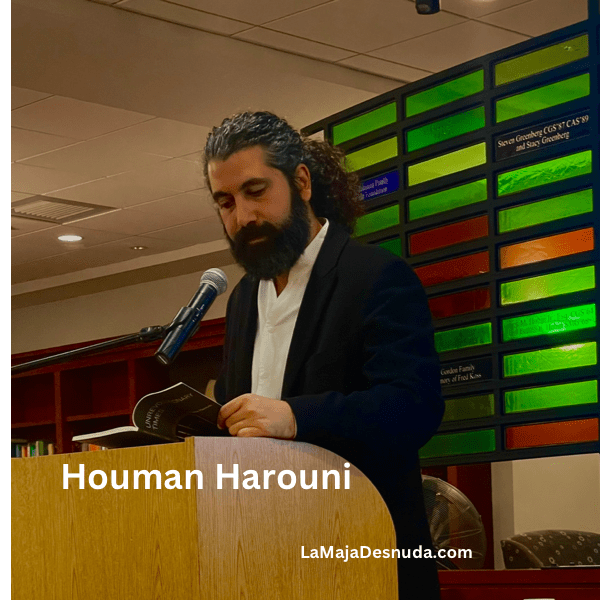Houman Harouni was born in Tehran, Iran, in 1982, and migrated, as a refugee, to the United States in 1997. His father was, for a time, a professional revolutionary, and his mother, for a time, a sociologist of revolution. He is a theorist of cultural transformation. His work moves across philosophy, political economy, history of science, psychology, theater, and literature, culminating in his pedagogy of Active Theory, which he has taught at the Harvard Graduate School of Education since 2015. His academic and journalistic writings have appeared in a wide array of publications, including The Guardian, PBS Frontline, The White Review, and the Harvard Educational Review. He has been awarded Fellowships at the American Academy of Arts and Sciences and the National Academy of Education. Unrevolutionary Times is Harouni’s first collection of poems. (Arrowsmith Press).
Houman Harouni nació en Teherán (Irán) en 1982 y emigró, como refugiado a Estados Unidos en 1997. Su padre fue, durante un tiempo, revolucionario profesional y su madre, socióloga de la revolución. Es teórico de la transformación cultural. Su trabajo se mueve a través de la filosofía, la economía política, la historia de la ciencia, la psicología, el teatro y la literatura, culminando en su pedagogía de la Teoría Activa, que enseña en la Harvard Graduate School of Education desde 2015. Sus escritos académicos y periodísticos han aparecido en una amplia gama de publicaciones, entre ellas: The Guardian, PBS Frontline, The White Review y Harvard Educational Review. Ha recibido becas de la Academia Americana de las Artes y las Ciencias y de la Academia Nacional de Educación. Unrevolutionary Times es el primer poemario de Harouni, publicado por Arrowsmith Press
El derviche
Las posturas en las que mantuve largas respiraciones
por el flujo del Ganges
no las sostuve para alcanzar la luz
no tenía ninguna estrella a la vista
mientras convertía mi cuerpo en un arco
Si recé
en mi pequeño apartamento americano
donde cada superficie
miraba mis labios con desprecio
no recé por justicia
Sino para que la voz de este extraño se escurriera de mi
El arte de la guerra
el camino del monje
todos los pilares de la sabiduría
yacen sumergidos en el frágil frío del tiempo
y la corriente arrastra sus restos
al pequeño recinto
de una última alma impaciente
Estas líneas profanas que tallé
en los muros de tu ciudad
no se atrevieron a esperar
profundizar en tu amor
sólo disminuir la distancia
entre un nombre y otro
De este modo
el derviche ha honrado los errores de su vida
Traducción: Nidia Hernández.
***
The Dervish
The postures I held for long breaths
by the flow of the Ganges
I did not hold to achieve light
I held no star in sight
as I turned my body into a bow
If I prayed
in my small American flat
where every surface
eyed my lips with contempt
I did not pray for justice
but for this stranger’s voice to drain from me
The art of war
the way of the monk
all the pillars of wisdom
lie submerged in the brittle cold of time
and the current pulls their remnants
into the small enclosure
of one last impatient soul
These profane lines I carve
into the walls of your city
did not dare hope
to deepen your love
but only to lessen the distance
between one name and another
In this way
the dervish has honored the mistakes of his life


